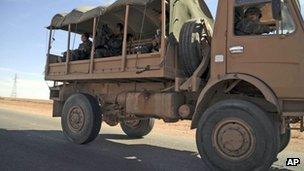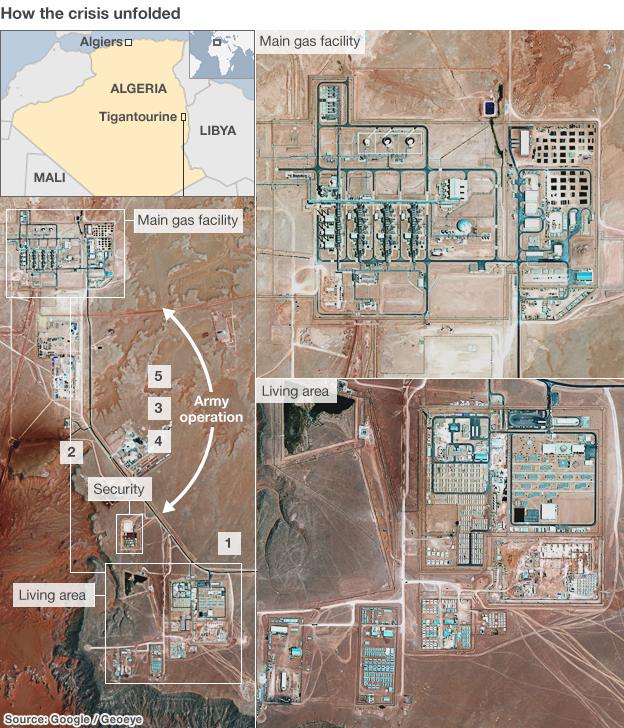Algeria crisis: Hostage death toll 'rises to 48'
- Published

The army reportedly launched an assault on Saturday after militants began killing hostages
At least 48 hostages are now thought to have died in a four-day siege at an Algerian gas plant, as reports say that 25 bodies found at the complex on Sunday were all those of captives.
It had initially been unclear whether the bodies found were those of hostage-takers or staff at the facility.
A search is continuing at the In Amenas gas plant, where as many as 20 hostages remain unaccounted for.
Five suspected Islamist attackers were reportedly arrested on Sunday.
The Algerian authorities had said on Saturday that all 32 hostage-takers had been killed. The suspected organiser of the attack, Mokhtar Belmokhtar, said 40 militants had taken part.
The siege ended when troops mounted an assault on Saturday, saying the militants had begun killing foreign hostages.
Western leaders condemned the attack with French Defence Minister Jean-Yves Le Drian describing it as an "act of war".
The plant, which is responsible for more than a tenth of Algeria's overall gas output, is expected to resume production by Tuesday, Algeria's Energy Minister Youcef Yousfi said.
Prime Minister Abdelmalek Sellal is due to give a new conference about the attack later on Monday.
Filipinos dead
The energy minister also pledged to boost security at energy installations but insisted it was "out of the question to allow foreign security forces to handle the security" of Algerian oil facilities.
During a visit to the affected plant on Sunday, Mr Yousfi said it would resume production within two days.
Security forces reportedly discovered the bodies of 25 hostages as they searched the complex for booby-traps and mines.
The militants had threatened to blow up the site and kill their hostages, officials said.
Belmokhtar, who is not thought to have been among the actual attackers, said his group had carried out the attack. He was speaking in a video message carried by the Mauritanian website Sahara Media.
The website said the video had been recorded on 17 January while the siege was still going on but not posted on the website.
It shows Belmokhtar, who has convictions in absentia for murder, kidnapping and terrorism, saying he was prepared to negotiate with Western and Algerian leaders if operations against Islamists in Mali were stopped.
In other developments:
Six Filipinos were killed and four are missing , the government in Manila confirmed
Three Britons were confirmed dead, and a further three are missing, feared dead. UK officials were "working hard" to locate the missing, said Foreign Secretary William Hague
A Colombian citizen resident in the UK, Carlos Estrada, is thought to be among the dead, the Colombian president has said
Japanese officials said they had no confirmation of the fate of 10 nationals who remained unaccounted for, despite reports that nine had died
Romania's foreign ministry said one of its citizens had died in hospital after sustaining severe injuries during the siege. Another Romanian has already been reported killed and as many as three others have been freed
Two Malaysians are unaccounted for, as are five Norwegians
The crisis began on Wednesday when militants attacked two buses carrying foreign workers to the remote site in south-eastern Algeria. A Briton and an Algerian died in the incident.
The militants then took expatriates hostage at the complex, which was quickly surrounded by the Algerian army.
Algerian state media said later that 685 Algerian workers at the plant had been freed but it is unclear if any Algerians were actually taken hostage, with reports that militants told them they were only targeting non-Muslims.
A statement from the kidnappers said the assault on the gas plant had been launched in retaliation for French intervention against Islamist groups in neighbouring Mali.
However, France only decided last week to intervene militarily in Mali. Analysts say the assault on the gas facility was well-planned and would have required advance research, as well as possibly inside help.

Bus attack: 05:00 local time 16 January: Heavily armed gunmen attack two buses carrying gas field workers towards In Amenas airfield. A Briton and an Algerian die in the fighting.
Hostages taken: The militants drive to the installation at Tigantourine and take Algerian and foreign workers hostage in the living area and the main gas facility at the complex.
Army surround complex: Security forces and the Algerian army surround the hostage-takers. Western leaders, including the UK's David Cameron, urge Algeria to consult them before taking action.
Army attacks: 12:00 (13:00 GMT) 17 January: Algerian forces attack as militants try to move some of their captives from the facility. Reports say some hostages escape, but others are killed.
Final assault: The Algerians ended the raid on 19 January, killing the last 11 captors after they had killed seven hostages, state media reported. At least 48 hostages and 32 militants in total are now believed to have died.